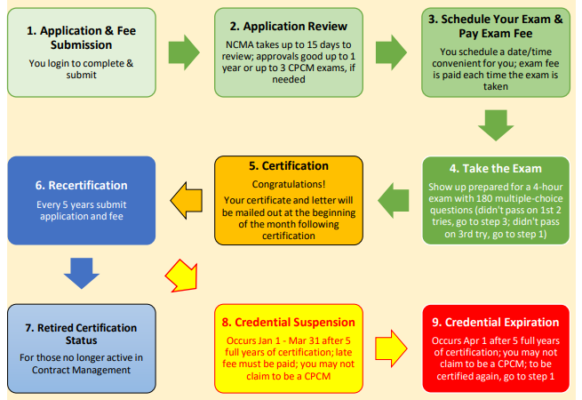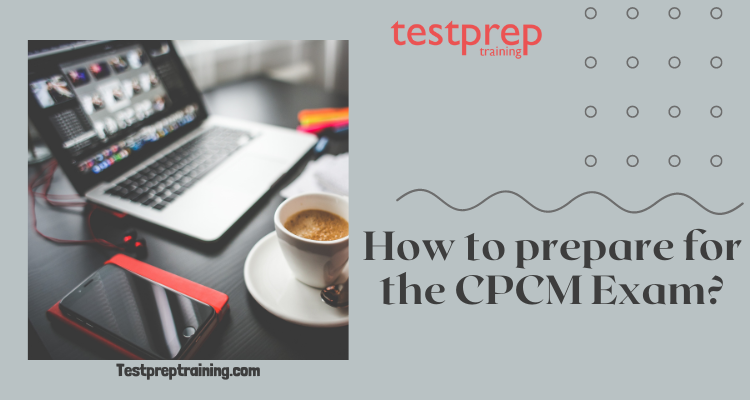A certified professional contracts manager (CPCM) credential demonstrates your expertise in all elements of contract administration, including in the public and private sectors. A candidate must pass the Certified Professional Contracts Manager module test to become a CPCM. A mark of distinction is certification. It distinguishes the credentialed person and his or her workplace from those of other people in the same profession. A certified person conveys that they have acquired a specific level of knowledge and are dedicated to upholding the highest standards of professionalism. Let’s know the CPCM exam preparation process.
About Certified Professional Contract Manager (CPCM™)
Holders of the CPCM designation are professionals who have mastered the skills in the Contract Management Body of Knowledge. A Certified Professional Contracts Manager (CPCM) certification indicates that the candidate has met the highest requirements and norms set by NCMA for education, experience, training, and contract management proficiencies and has shown their understanding of these skills. With a CPCM, a candidate may demonstrate that they are knowledgeable about every aspect of contract administration, both in the private and public sectors.

The exam has been designed for the following set of people –
- Contract Management Professionals
- Contract Manager
- Contract Engineer
- Contract Administrator
- Bid & Tender Specialist
- Procurement
- Contract Coordinator
- Contract Executive
- Commercial Manager
- Procurement
Exam format and prerequisites
Below mentioned is the exam format –
| Exam Name | Certified Professional Contract Manager |
| Exam Format | Multiple Choice Questions |
| Time Duration | 4 hours |
| Total Number of Questions | 180 (out of which 30 are scenario-based) |
| Passing Score | 70% |
| Exam Fees | $125 (US & Canada) $150 (Rest others) |
| Mode of Exam | Computer-based |
The following prerequisites have been established by NCMA for candidates to take the CPCM exam:
- First and foremost, a bachelor’s degree
- Furthermore, foreign degrees must be examined by an impartial third party, such as SpanTran, World Education Services, Scholaro, Credit Eval, or Info Check USA.
- 5 years of professional experience in contract management or a similar sector is also required.
- A minimum of 120 hours of CPE/CLP to finish.
Now that we know all the basic details about the exam, let’s know how one can prepare to ace this exam in just one go!
How can you get ready to take the CPCM Exam?
The CPCM® (Certified Professional Contract Manager) credential verifies a person’s education, training, experience, and knowledge of the uniform commercial code. It also attests to their demonstrated understanding of the contract management competencies found in the Contract Management Body of Knowledge. You may learn more about preparing for the exam with the help of this guide.
Step 1: Familiarize yourself with the Exam Domains
You must include this in your exam preparation. In other words, every exam covers material that is pertinent. It is essential to go over each portion once more to comprehend the material completely. List the domains and things you want to investigate. The test’s goals are as follows:
| CMBOK Competencies | CPCM Knowledge Content Areas |
| 1.0 Leadership 1.1 Competence 1.2 Character 1.3 Collaboration 1.4 Vision | K1.0 Leadership Knowledge Content Area K1.1 Oral and Written Communication Techniques K1.2 Effective Listening Techniques K1.3 Self-Awareness Techniques K1.4 Team Leadership Techniques K1.5 Customer Relationship Management (CRM) Techniques K1.6 Networking Techniques K1.7 Decision-Making Techniques K1.8 Critical Thinking Techniques K1.9 Conflict Management Techniques K1.10 Succession Planning Techniques |
| 2.0 Management 2.1 Business Management 2.2 Financial Management 2.3 Project Management 2.4 Risk Management 2.5 Supply Chain Management | K2.0 Management Knowledge Content Area K2.1 Management Tools and Techniques K2.2 Generally Accepted Accounting Principles K2.3 Analysis of Financial Statements K2.4 Principles of Budgeting K2.5 Principles of Economics K2.6 Principles of Marketing K2.7 Life Cycle Management K2.8 Principles of Financial Management K2.9 Principles of Project Management K2.10 Risk Analysis and Mitigation Strategies K2.11 Principles of Supply Chain Management |
| 3.0 Guiding Principles 3.1 Skills and Roles 3.2 Contract Principles 3.3 Standards of Conduct 3.4 Regulatory Compliance 3.5 Situational Assessment 3.6 Team Dynamics 3.7 Communication and Documentation | K3.0 Guiding Principles Knowledge Content Area K3.1 Defining Team Roles and responsibilities K3.2 Problem-Solving Techniques K3.3 Strategic Planning and Execution K3.4 Forms of Legal Relationships K3.5 Organizational Regulations, Codes, Policies, and Procedures K3.6 Professional Standards of Conduct and Codes of Ethics K3.7 Classes of Agents K3.8 Basis of Authority of Agents to Act K3.9 Contract Law K3.10 Contract Funding Laws, Policies, and Procedures K3.11 Intellectual Property |
| 4.0 Pre-Award Domain A: Develop Solicitation 4.1 Plan Solicitation 4.2 Request Offers Domain B: Develop a Proposal 4.3 Plan Sales 4.4 Prepare Offer | K4.0 Pre-Award Knowledge Content Area K4.1 Requirements Identification Techniques K4.2 Elements of Planning K4.3 Market Research Techniques and Tools K4.4 Life Cycle Management K4.5 Performance-Based Acquisition K4.6 Unique Organizational Pre-Award Practices K4.7 Electronic Contracting Tools K4.8 Organizational and Personal Conflict of Interest Identification and Mitigation Strategies K4.9 Types of Contracts K4.10 Other Contracts, Agreements, and Arrangements K4.11 Methods to Solicit Offers K4.12 Contract Incentives K4.13 Contract Financing Options K4.14 Legal Entity Structures K4.15 Elements of a Solicitation Package K4.16 Elements of a Proposal Package K4.17 Proposal Evaluation Factors K4.18 Owner-Provided Property |
| 5.0 Award Domain C: Form Contract 5.1 Cost or Price Analysis 5.2 Plan Negotiations 5.3 Select Source 5.4 Manage Disagreements | K5.0 Award Knowledge Content Area K5.1 Contract Negotiation Strategies and Tactics K5.2 Proposal Evaluation Techniques K5.3 Unique Organizational Award Practices K5.4 Pricing and Payments K5.5 Price and Cost Analysis K5.6 Contract Format Methods K5.7 Documentation Techniques to Mitigate Risk |
| 6.0 Post-Award Domain D: Perform Contract 6.1 Administer Contract 6.2 Ensure Quality 6.3 Manage Subcontracts 6.4 Manage Changes Domain E: Close Contract 6.5 Close-Out Contract | K6.0 Post-Award Knowledge Content Area K6.1 Types of Contract Changes K6.2 Contract Change Management K6.3 Elements of a Subcontract Package K6.4 Subcontract Management Techniques K6.5 Legal Dispute Resolution K6.6 Alternate Dispute Resolution Methods K6.7 Forms of Contract Termination K6.8 Unique Organizational Post-Award Practices K6.9 Inspection and Acceptance K6.10 Quality Assurance Principles K6.11 Quality Management Principles K6.12 Types of Audits K6.13 Contract Close-Out Procedures |
| 7.0 Learn 7.1 Continuous Learning 7.2 Individual Competence 7.3 Organizational Capability | K7.0 Learn Knowledge Content Area K7.1 Career Planning and Development K7.2 Professional Development Techniques K7.3 Goal Setting K7.4 Skills Gap Analysis K7.5 Developing a Learning Organization K7.6 SWOT Analysis K7.7 Knowledge Transfer Evaluation Techniques K7.8 Life Balance Tools and Techniques |
Step 2: Create a schedule to study.
It’s time to make a study timetable now that you know what needs to be learned. Plan your study carefully and organize all of the topics after learning about the domains and all of the things that are covered inside them. Make sure you learn new facts about the previous area as you transition from one to the other. But there are a few things to consider when making a study plan:
- The ideal period for studying
- The maximum number of hours per day or week that you can spend studying.
- then using instruction and authorized study materials
- Which practice or training approach is most effective for becoming ready?
Step 3 – Refer Body of Knowledge for Contract Management
A shared understanding of the jargon, procedures, guidelines and processes used in contract management is provided by the sixth edition of The Contract Management Body of Knowledge. It gives you more thorough and in-depth descriptions of the skills listed in the American National Standards Institute-accredited Contract Management Standard.
Step 4 – Online Classroom
The Certified Professional Contract Manager Online Course is a comprehensive 10-week online, instructor-led course if you prefer structured exam preparation. You will learn by completing weekly readings and assignments, taking part in discussion groups, watching videos and recorded lessons, and passing practice exams. You can read and review all of the course materials for the Certified Professional Contract Manager training course from any location with an internet connection at any time, giving you the flexibility to suit your studies around your busy schedule.
Step 5 – Use practice tests to evaluate your performance.
Examine your advantages and disadvantages by working on example papers. Giving practice exams is definitely advised before taking the certification exam. It will let you assess your preparation and skills while acquainting you with the format of the test. Utilize the most recent and updated practice exams that TestPrepTraining is providing you with FREE of charge to evaluate your knowledge and your performance.
Final Words
Like all exams, the CPCM, or Certified Professional Contracts Manager as it is commonly known, allows NCMA some latitude to examine various topics. As a result, since they assess a wide variety of subjects, it is necessary to be familiar with the bulk of CPCM content.
Also, keep in mind that experience requirements frequently develop as a result of observations made about the typical person and what is necessary. To succeed with the CPCM, you can always push past that, although it could require more effort. Keep in mind that amazing things take time. And just like the construction of ancient monuments took years, certification is difficult. Additionally, it is not always speedy. Yet it’s worthwhile!


